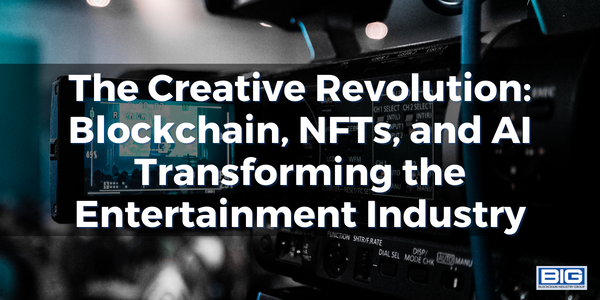
The entertainment industry has always been at the forefront of innovation, constantly seeking new ways to engage audiences and deliver captivating experiences. In recent years, a creative revolution has taken place, driven by the integration of blockchain, non-fungible tokens (NFTs), and artificial intelligence (AI).
In this article, we delve into the ways these technologies are transforming the entertainment landscape, revolutionizing content creation, distribution, and monetization.
Blockchain: Revolutionizing Transparency and Ownership
Blockchain technology has emerged as a game-changer for the entertainment industry, offering unparalleled transparency and ownership verification. By leveraging blockchain, creators can securely store and protect their intellectual property rights, ensuring that their work is not plagiarized or exploited without consent. Additionally, blockchain’s decentralized nature eliminates the need for intermediaries, providing artists with greater control over their creations.
Example: Verifying Authenticity with NFTs Non-fungible tokens (NFTs) have gained significant attention in the entertainment industry, revolutionizing the way digital assets are bought, sold, and owned. NFTs enable creators to tokenize their work, making it unique and verifiably authentic. For example, a musician can release an NFT representing a limited edition of their album, giving buyers exclusive ownership rights. These NFTs are recorded on the blockchain, ensuring transparency and authenticity.
AI: Enhancing Creativity and Personalization
Artificial intelligence is playing a transformative role in the entertainment industry, empowering creators to enhance their artistic vision and personalize content for individual audiences. AI algorithms can analyze vast amounts of data to understand consumer preferences, allowing creators to tailor their content to specific demographics and deliver more immersive experiences.
Example: AI-Generated Content AI-driven content generation is becoming increasingly prevalent, particularly in fields such as music and visual arts. For instance, AI algorithms can analyze an artist’s existing works and generate new pieces in a similar style, expanding their creative output. This opens up new possibilities for artists to experiment with different genres and explore uncharted territories, pushing the boundaries of creativity.
NFTs: Redefining Ownership and Monetization
Non-fungible tokens have revolutionized ownership and monetization models in the entertainment industry. NFTs provide a unique digital certificate of ownership for digital assets, allowing creators to sell their work directly to fans and collectors. Artists can now monetize their creations more effectively, bypassing traditional gatekeepers and earning royalties each time their NFTs are resold.
Example: NFT Artwork Sales
The art world has witnessed a groundbreaking shift with the rise of NFTs. Artists can create and sell digital artwork as NFTs, granting buyers exclusive ownership rights. Collectors can trade these NFTs on various online marketplaces, with each transaction recorded on the blockchain. Notably, artists can earn royalties whenever their NFTs are resold, providing a sustainable revenue stream and ensuring ongoing support for their creative endeavors.
The Convergence of Blockchain, NFTs, and AI
The convergence of blockchain, NFTs, and AI is where the true transformative power lies. When combined, these technologies create a dynamic ecosystem that revolutionizes content creation, distribution, and monetization. Creators can leverage AI to personalize content, tokenize their work as NFTs, and utilize blockchain for transparent ownership and monetization. This seamless integration empowers artists to engage with their audience directly, build loyal communities, and create sustainable income streams.
Example: Virtual Reality Experiences
Imagine a virtual reality (VR) experience created by an artist. By using AI algorithms to personalize the content based on user preferences, the VR experience becomes a truly immersive and individualized journey. The artist can customize the virtual environment, music, and interactive elements based on the user’s interests and feedback. This level of personalization creates a deeply engaging and unforgettable experience for the audience.
Through the integration of blockchain and NFTs, the artist can tokenize the VR experience, allowing users to purchase and own a unique piece of the virtual world. Each NFT represents a distinct portion of the experience, such as a specific location or interactive object, granting exclusive ownership rights to the buyer. This not only provides a sense of ownership and collectability but also opens up possibilities for further monetization.
Furthermore, the blockchain ensures transparency and authenticity in the ownership of these virtual assets. Users can verify the legitimacy and rarity of their NFTs, as every transaction and ownership transfer is recorded on the blockchain. This gives artists and collectors confidence in the provenance and value of their digital creations, fostering trust within the ecosystem.
Healthcare Services and the Disruptive Impact of AI
—
How Bots and AI Could Undermine the Community-Centric Information Sharing
—
How DAOs Will Form the Basis of Government: Utilizing AI and Blockchain for People-Centric Governance
The seamless integration of blockchain, NFTs, and AI in the entertainment industry is fueling a creative revolution. Artists are empowered to explore new avenues of expression, engage with their audience on a deeper level, and monetize their work in innovative ways. The traditional barriers that once limited artists’ reach and revenue are being dismantled, paving the way for a more inclusive and sustainable entertainment landscape.
The integration of blockchain, NFTs, and AI is transforming the entertainment industry, ushering in a new era of creativity, ownership, and monetization. Artists and creators now have the tools to forge direct connections with their audience, personalize experiences, and secure their intellectual property rights. As the creative revolution unfolds, we can expect to witness even more groundbreaking innovations that redefine the boundaries of imagination and artistic expression. The future of entertainment is here, and it is driven by the seamless interplay of blockchain, NFTs, and AI.



